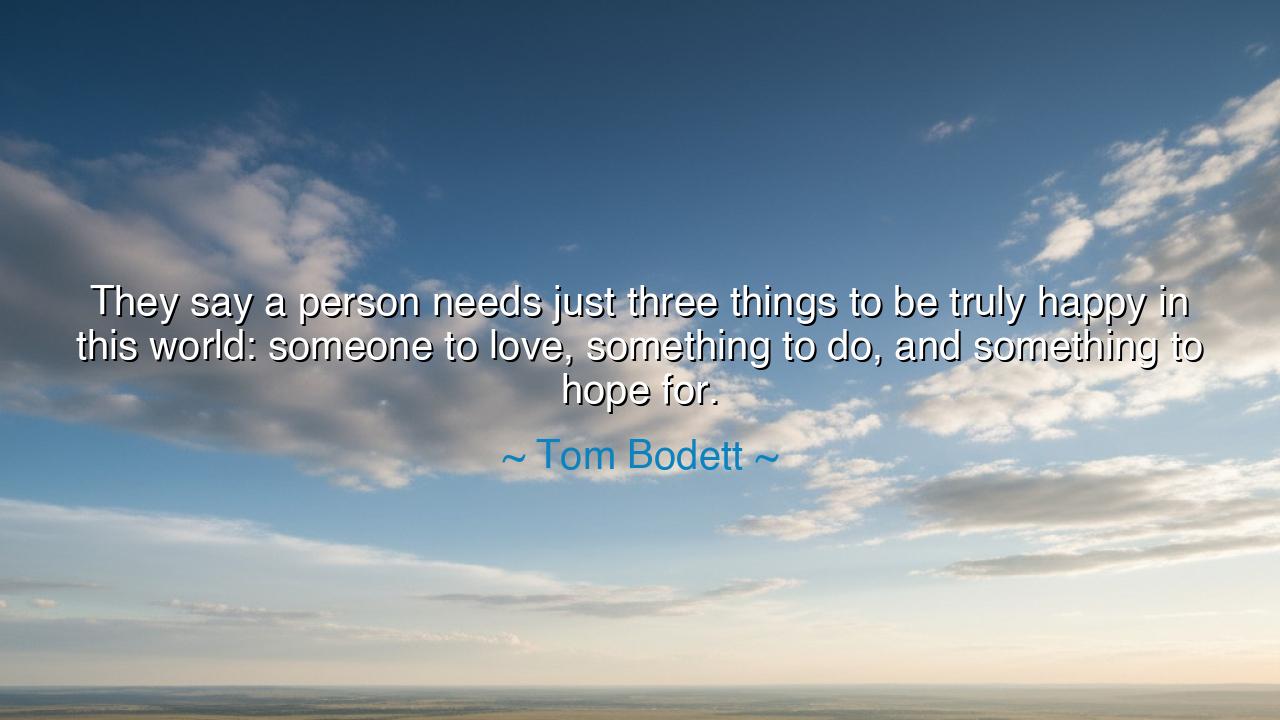
They say a person needs just three things to be truly happy in
They say a person needs just three things to be truly happy in this world: someone to love, something to do, and something to hope for.






“They say a person needs just three things to be truly happy in this world: someone to love, something to do, and something to hope for.” Thus spoke Tom Bodett, a man better known for his humor and warmth than for philosophy, yet in this single sentence, he distilled a truth as ancient as humanity itself. His words are simple, but they ring with the clarity of wisdom long carried by the hearts of the wise: that the essence of a meaningful life rests upon love, purpose, and hope. These are not luxuries for the fortunate few—they are the three pillars that hold up the temple of the human spirit.
To have someone to love is to be anchored in connection. From the dawn of time, no soul has flourished in isolation. Love, in all its forms—romantic, familial, or fraternal—is the great fire that warms existence. It gives us reason to rise each day, to endure hardship, and to celebrate joy. The ancients knew this well: Aristotle spoke of friendship as the highest virtue, and Confucius taught that harmony among people was the root of all order. Without love, life becomes a barren plain; with it, even suffering finds meaning. For to love is to know the divine—to reach beyond the boundaries of self and touch something eternal.
The second need, something to do, speaks of purpose. It is not enough to exist; one must act, build, and contribute. The heart, filled with love, seeks to express that love through creation and labor. Work, in its truest form, is the translation of inner passion into outward form. A farmer tending his field, a teacher shaping young minds, a poet crafting words that stir the soul—each fulfills this calling. The wise of every age have taught that idleness is poison to the soul. The Stoics declared that to live well is to live with purpose, and that even the smallest act done with intention ennobles life. Something to do is not mere labor—it is the act of participating in the unfolding of the world, of making one’s brief time upon the earth an offering of meaning.
And the third, something to hope for, is the breath of the spirit. Without hope, love and purpose wither into despair. Hope is the light that shines beyond the horizon, even when the road ahead is dark. It whispers to us that tomorrow can be better, that struggle is not in vain. It is the seed of resilience that survives every winter of the soul. The prophets of every faith, the poets of every age, have sung of hope. When Nelson Mandela spent twenty-seven years in a prison cell, it was hope—not freedom—that sustained him. He believed that one day his people would walk free, and so they did. Hope, unseen yet unbreakable, is the bridge between the present and the possible.
These three elements—love, purpose, and hope—are not separate threads but interwoven strands of one fabric. Love inspires us to act; action gives meaning to our hope; and hope, in turn, renews our capacity to love. When any of the three is lost, life tilts toward imbalance. One who loves without purpose becomes consumed by longing. One who works without hope becomes hollow. One who hopes without love dreams of a world he will never build. To be whole, the human heart must hold all three, as the sun holds light, warmth, and life within a single flame.
Consider the story of Viktor Frankl, the Austrian psychiatrist who endured the horrors of the Nazi concentration camps. Stripped of freedom, starved, and surrounded by death, he discovered a profound truth: those who survived were not the strongest in body, but those who still had a reason to live. In the midst of darkness, he clung to three things: the love of his wife, the work he would one day complete, and the hope that meaning still existed even in suffering. From this revelation, he wrote Man’s Search for Meaning, a testament to Bodett’s very insight—that happiness and endurance spring not from comfort, but from inner purpose, anchored in love and sustained by hope.
The lesson is clear, and it is timeless: cultivate these three things within yourself. Love—give it freely and without fear. Let it connect you to others and soften your heart against the world’s hardness. Work—not only for gain, but for the joy of creation, the satisfaction of using your gifts to serve life. And hope—guard it like a flame, especially when the winds of despair rise. Look always toward what might yet be, and let it pull you forward when your strength fails.
In the end, Bodett’s words are not merely a formula for happiness—they are a map for living wisely. To love gives life its depth; to work gives it shape; to hope gives it light. These are the sacred triad of human existence, handed down through the ages in every language and every faith. Remember them, teach them, and live by them—for in doing so, you will not only find happiness, but also the quiet, enduring peace that belongs to those who have truly understood what it means to be alive.






AAdministratorAdministrator
Welcome, honored guests. Please leave a comment, we will respond soon